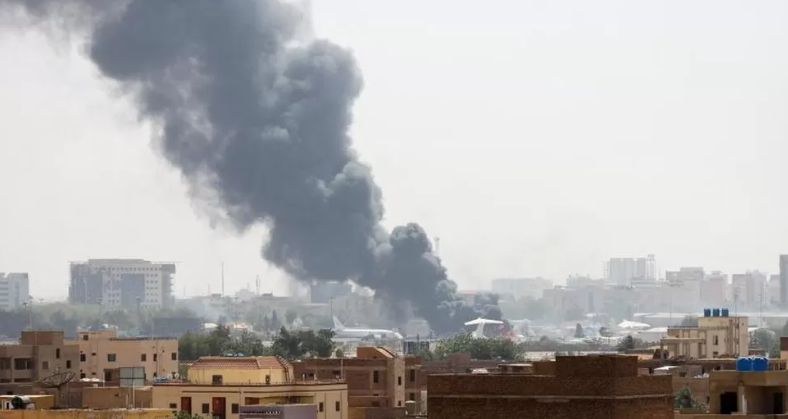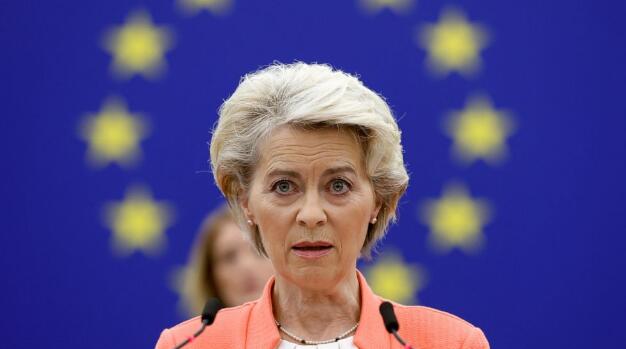A small British military reconnaissance team is in Sudan to consider evacuation options, as pressure builds on the government to rescue more UK nationals.
Defence minister James Heappey confirmed troops are there – but no evacuation plan has yet been announced.
On Sunday, the UK airlifted diplomats and their families out of Sudan in a military operation.
But thousands of UK passport holders remain in the country, where hundreds have died amid street gun battles.
Violence broke out on 15 April, primarily in the capital city Khartoum, between rival military factions battling for control of Africa’s third largest country.
Around 4,000 UK citizens are thought to be in Sudan and 2,000 of them have already requested help, Foreign Office minister Andrew Mitchell told MPs on Tuesday.
Hundreds of people have been airlifted from Sudan by other countries, including more than 1,000 people by European Union nations. Five British people were among nearly 200 people evacuated by Saudi Arabia.
Some UK nationals have said they felt abandoned by the government.
Amar Osman, a British citizen from Dunfermline in Fife, told the BBC he feared his family would die in Sudan unless they could get themselves out after becoming trapped north of the capital.
“It’s getting worse by the minute, so we’re thinking of evacuating by road to Egypt,” said Mr Osman, who was visiting relatives when fighting began.
“I’m doing it all by myself. I’m getting the money together, I’m getting all my family together. There’s six of us.”
- ‘We feel abandoned’ – UK citizens stuck in Sudan
News of a 72 hour ceasefire due to come into effect from midnight on Tuesday will raise hopes that a mass evacuation may be more feasible, but previous agreements between the warring parties have failed to hold.
The BBC understands a small military team landed in Port Sudan, more than 500 miles from Khartoum, to asses potential routes out.
Work is under way to provide the prime minister with several options, defence sources said, and it is understood two Royal Navy ships are already in the region – the frigate HMS Lancaster which was already at sea, and supply ship RFA Cardigan Bay which is in Bahrain where it was undergoing maintenance.
Mr Mitchell urged anyone trapped in Sudan to stay indoors where possible but to “exercise their own judgement about whether to relocate”, adding they “do so at their own risk”.
He told the Commons that Khartoum’s main airport, where there has been fighting in recent days, was “out of action”. Energy and communications were disrupted, while food and water were becoming “increasingly scarce”, he said.
Defence sources told the BBC any Sudan evacuation would be more difficult than the August 2021 Afghanistan airlift, due to fighting around the capital and an absence of troops already on the ground.
Khartoum is “more dynamic, more dangerous” than Kabul was at the time, they said, with armed clashes happening “in the neighbourhoods where western nationals are most heavily concentrated”.
Commenting on the advice being issued to people trapped in Sudan, the defence source added: “If you tell people to stay at home they may be less likely to get shot. But the availability of food and water in the city is increasingly limited.
“If you tell people to leave home it’s towards safety. Then they get closer to food and water but they might be at increased risk.”
Responding to questions from MPs, Mr Mitchell also confirmed that neither the UK’s ambassador to Sudan nor the deputy head of mission were in the country when the conflict began.
A team of 200 officials is working around the clock in the Foreign Office to provide consular assistance to those who need it, and regular updates are being issued, he added.
British doctor Iman Abu Gargar told the BBC she was able to leave with the French evacuation because Irish passport holders, including her son, were able to join.
- MAPS: Khartoum violence mapped as civilians flee
- UNSUNG HEROES: How food and medicines are being delivered
- SIMPLE GUIDE: What is going on in Sudan?
Speaking from Djibouti, which lies to the east of Sudan, Dr Gargar said she felt left behind by the UK. She said she was forced to leave her father there, adding: “There were only difficult decisions to make. I hope no-one has to make the decisions I had to make.”
Some MPs have put pressure on the government to speed up efforts, including Alicia Kearns, the Tory chairwoman of the Commons Foreign Affairs Committee, who told the Commons that “time is running out”.
Labour’s shadow minister for Africa, Lyn Brown, said what people trapped in Sudan need to hear “is a clear plan on how the government will support those still in danger and how they will communicate with them and when”.
She added: “Naturally, questions will be asked about whether the government has learned the lessons of the chaotic Afghanistan withdrawal.”
A successful operation to rescue diplomats and their families was carried out over the weekend, after gun battles broke out around the embassy in Khartoum.
The BBC understands that UK special forces troops landed in Khartoum on Saturday alongside the US evacuation team.
Military vehicles were used to rescue embassy staff and transport them to an airport outside the capital, before they were flown to Cyprus.
Around 1,200 personnel from the Army, Royal Navy and Royal Air Force were involved in the rescue, and a C-130 Hercules and Airbus A400M transport aircraft were used.
Mr Heappey, who holds the armed forces portfolio in the MoD, said the embassy rescue mission “went without a hitch” despite its complexity but that the “job isn’t done”.
- How do countries evacuate people from a war zone?
The situation on the ground is at times “extremely dangerous”, he said, and the “window in which the environment is permissive is rarely long enough in which to do the military options”.
Mr Heappey admitted the UK had been caught out by the rapid deterioration in Sudan, adding: “It is fair to say that nobody in the UK government nor really in the wider international community saw fighting of this ferocity breaking out in the way that it did.”
Around 400 UK nationals in Sudan hold only a British passport, while about 4,000 more are dual citizens, Mr Mitchell told the Commons.
Another Cobra meeting – an emergency response committee made up of ministers, civil servants and others – was held on Monday to discuss the situation.
UN secretary-general Antonio Guterres told a meeting of the UN Security Council that the situation in Sudan was worsening and the country was on “the edge of the abyss”.
“The violence must stop. It risks a catastrophic conflagration within Sudan that could engulf the whole region and beyond,” he said.
Sudan has experienced a near total internet outage in recent days, but BBC Monitoring reported that some connectivity was returning on Monday night.



